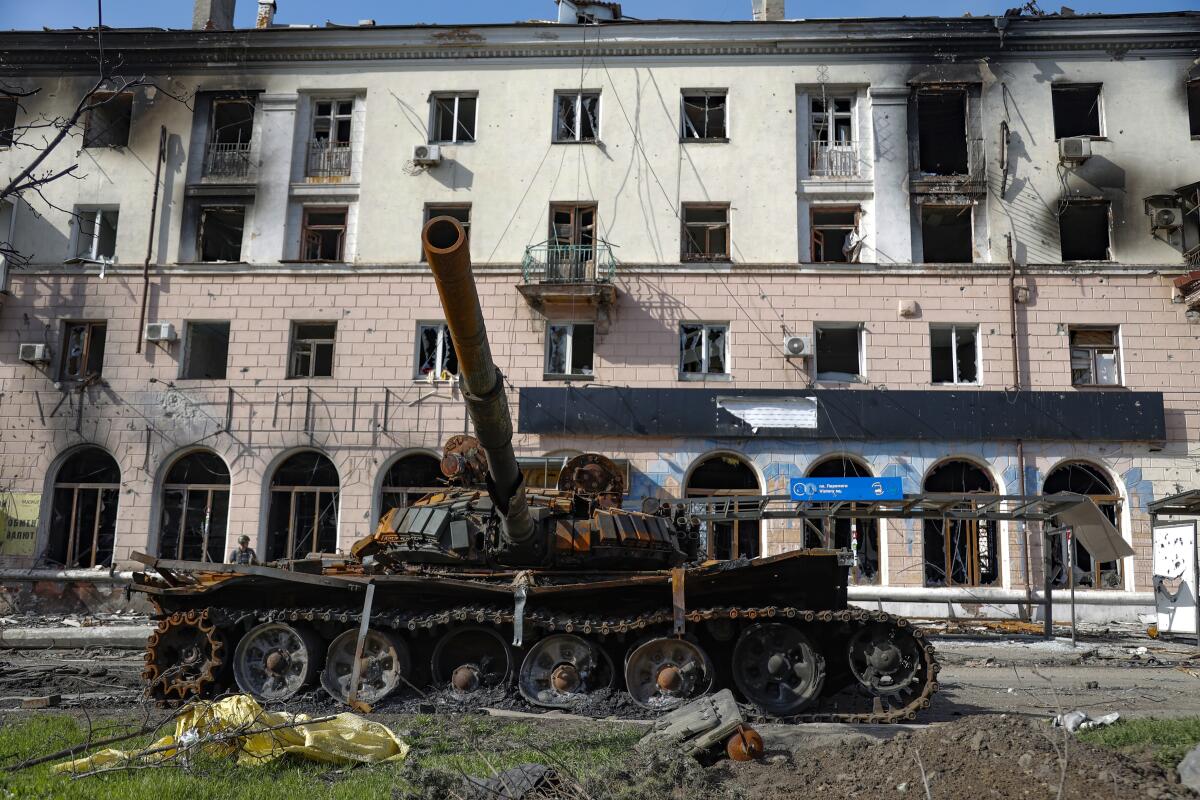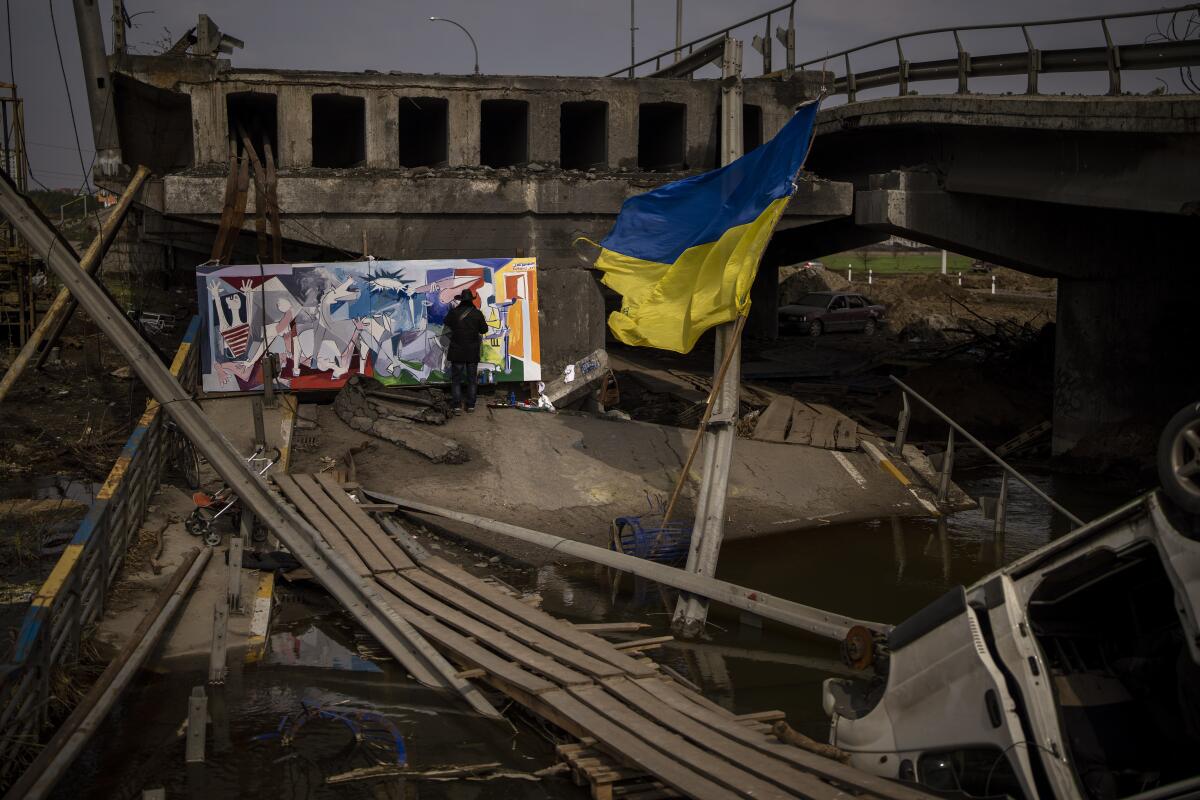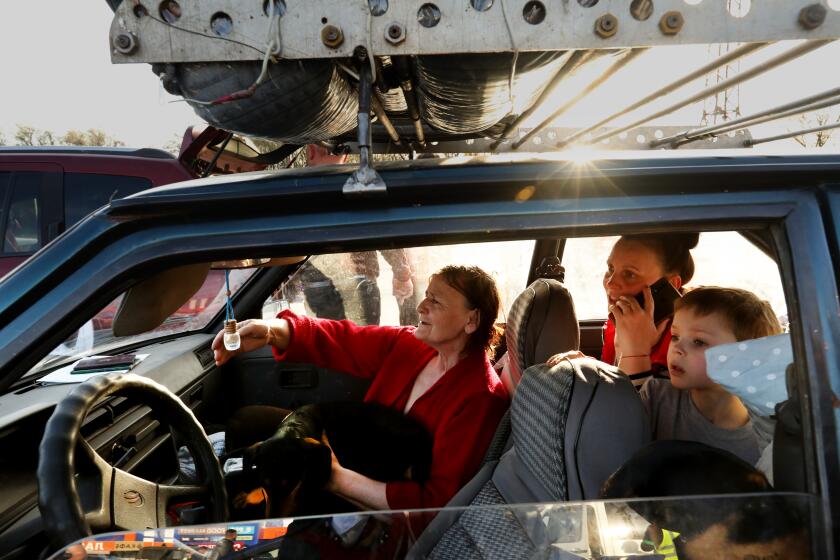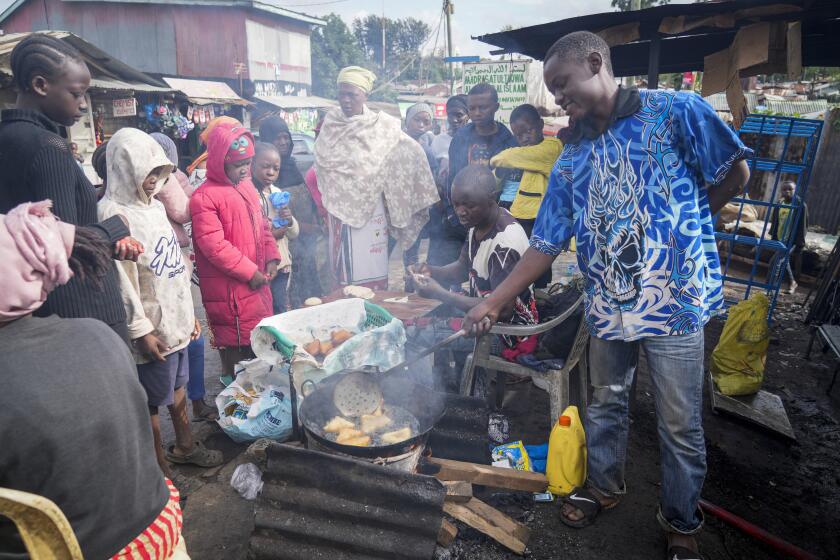Russia takes economic aim at countries aiding Ukraine, where it continues shelling the east

The gas cutoff signals Moscow’s willingness to take sharp economic aim at those who aid Ukraine.
- Share via
KHARKIV, Ukraine — Moscow on Wednesday turned off the natural-gas spigot to the front-line Eastern European states of Poland and Bulgaria, signaling its willingness to take sharp economic aim at those who aid Ukraine.
Russian forces, meanwhile, rained shells on eastern Ukraine as they pressed ahead with their devastating 2-month-old invasion.
Addressing the first such supply disruption since the war’s start, Kremlin spokesman Dmitry Peskov strongly hinted that other European economies may be next. He told reporters Wednesday that if some customers “decline to pay under the new system” Russia has instituted — meaning in rubles instead of dollars or euros — they “of course” could face the same treatment.
Along a 300-mile battlefront in Ukraine’s Donbas region, Russian forces managed to capture a small town, Zarichne, the Ukrainian military said in an early morning operational report. The giant Azovstal steelworks in the battered southern port city of Mariupol, which has become a symbol of Ukrainian resistance, also came under new bombardment, the military said.
Russia has been trying since the start of the war to capture Mariupol, and the city’s last-ditch defenders and some civilians are holed up inside the sprawling Soviet-era steel complex laced with tunnels and bunkers. Even though fighting continues, Russian President Vladimir Putin has claimed victory in the siege of the city, which Ukraine has not acknowledged.

The northeastern city of Kharkiv, partially hemmed in by Russian troops and under heavy bombardment since the start of the war, was rocked by loud explosions shortly after midnight. Later, the regional governor said on the messaging app Telegram that overnight strikes in outlying towns had killed three people and wounded 15 others.
Heavy pounding in advance of major ground movement, sometimes including strikes on civilian areas, is key to the Russian strategy in the east, British military intelligence said in an assessment Wednesday.
After staying behind as long as they dare, residents who decide to flee besieged Mariupol find that a long and nerve-racking ordeal awaits.
Amid fears of a widening war, officials in a pro-Russia breakaway region of Moldova — Ukraine’s small, impoverished western neighbor — accused Ukraine on Wednesday of attacking it. Russia last week telegraphed its aim of seizing Ukraine’s southern seacoast to link up with that breakaway region, Transnistria, as well as with the Crimean peninsula, which Moscow seized from Ukraine in 2014.
In an overnight address, Ukrainian President Volodymyr Zelensky accused Russia of attempting to cause a “global price crisis” and sow chaos in the food market.
“Ukrainian exports will help stabilize markets,” he said, “so it is beneficial not only for us, but also for all Europeans.”
The war has disrupted commodity markets and altered global patterns of trade and production in ways that will keep prices at historically high levels through the end of 2024, according to a World Bank report released this week.
Energy prices worldwide are projected to increase more than 50% in 2022 before easing in 2023 and 2024, the report said. Non-energy prices are expected to rise nearly 20% this year.
Russia is the world’s second-largest gas producer, behind the U.S. It is among the top three nations in oil production, alongside the U.S. and Saudi Arabia, supplying about 10% of what’s consumed worldwide.
Russia is also a major producer of wheat, palladium and nickel, while Ukraine is a large exporter of corn and wheat, and a key route for the flow of Russian natural gas to Europe. Wheat prices are forecast to increase by more than 40% this year, the report found.
“This amounts to the largest commodity shock we’ve experienced since the 1970s. As was the case then, the shock is being aggravated by a surge in restrictions in trade of food, fuel and fertilizers,” Indermit Gill, the World Bank’s vice president for equitable growth, finance and institutions, said in a statement.
Wednesday’s announcement by Russia’s state-run fuel company, Gazprom, of the cutoff of Poland and Bulgaria came a day after Western allies, at U.S. urging, vowed to redouble shipments of weaponry to help Ukraine fight off Russian forces for what could prove to be a protracted confrontation.
The war between Ukraine and Russia, which supply 75% of the world’s sunflower oil, has caused already-rising cooking oil prices to spiral upward.
Germany, in a policy shift, said it would ship armored antiaircraft systems to Ukraine. U.S. Defense Secretary Lloyd J. Austin III, speaking at Tuesday’s gathering of NATO and other allies at a U.S. air base in western Germany, called on those who want to help Ukraine to “move at the speed of war” to rush in more heavy armaments.
As Russia readies more troops and armor for its expanded offensive in eastern Ukraine, its Defense Ministry in Moscow said 59 Ukrainian military targets were destroyed overnight in airstrikes. It said targets included hangars containing foreign-supplied weapons and ammunition, but did not provide specifics. The claims could not be independently verified.
Pentagon spokesman John Kirby told reporters Wednesday that dozens of the U.S. howitzers promised last week by the Biden administration are now in Ukraine.
U.S. training of Ukrainian personnel to use the howitzers is also underway in neighboring countries, Kirby said.
“It’s an active, kinetic fight there in the Donbas,” he said.
The suspension of gas exports to Poland and Bulgaria came after both countries, along with most other European Union nations, rejected Moscow’s demand that energy shipments be paid for in rubles, which would help prop up the Russian currency. Existing contracts almost uniformly specify dollar payments.
The EU promised Wednesday that it would forge a unified response to the cutoff, which European Commission President Ursula von der Leyen called a Russian attempt to “blackmail” Europe.

“This is unjustified and unacceptable,” Von der Leyen said in a statement. “And it shows once again the unreliability of Russia as a gas supplier.”
Polish Prime Minister Mateusz Morawiecki also scoffed at Moscow’s move. He told lawmakers that Russian-supplied energy was expected to be replaced by a combination of local production and gas transported from Norway.
Poland has drawn particular Russian ire because it has not only supplied Ukraine with weapons, but also has been a key conduit for arms from other North Atlantic Treaty Organization countries. The Polish government said it was prepared for the Russian step, which the onset of spring and warmer temperatures makes less alarming than if it had occurred just a few weeks ago.
Breaking News
Get breaking news, investigations, analysis and more signature journalism from the Los Angeles Times in your inbox.
You may occasionally receive promotional content from the Los Angeles Times.
The claim of Ukrainian aggression in Transnistria, also known as Trans-Dniester, came from the Interior Ministry of the separatist region, which said Ukraine launched drones and fired shots aimed at its territory. Local officials said this week that two radio towers were damaged in strikes, with explosions also reported in the pro-Moscow enclave’s capital, Tiraspol.
The Ukrainian government in Kyiv has denied any hostile actions directed at Transnistria, where a Russian garrison is stationed.
In Mariupol, prospects of alleviating the dire humanitarian situation for civilians — tens of thousands of whom remained trapped in the city, in addition to the few thousand sheltering at the steel plant — continued to remain distant.
Ukrainian officials said no agreements had been reached for setting up a humanitarian corridor Wednesday to try to get civilians out. A trickle of people has managed to flee the city, but Ukraine says Russia has repeatedly reneged on promises of safe passage for noncombatants.

Municipal authorities have estimated that the siege has left about 20,000 dead in bombardment and from starvation, and satellite imagery testifies to the presence of several mass graves on Mariupol’s outskirts.
Ukraine said there were no prospects for face-to-face talks between Zelensky and Putin, something Kyiv has repeatedly sought.
“The time of a meeting of the two countries’ presidents and the context of the meeting have not yet been determined,” said Ukraine’s lead negotiator, Mykhailo Podolyak.
A senior Biden administration official told reporters Wednesday that a prisoner exchange between the United States and Russia did not represent a change in the U.S. government’s stance on the war in Ukraine. The exchange involved a U.S. Marine veteran held by Russia and a convicted Russian drug trafficker imprisoned in the United States.
Bulos reported from Kharkiv and King from Krakow, Poland. Times staff writers Sarah Parvini in Los Angeles and Tracy Wilkinson in Washington contributed to this report.
More to Read
Sign up for Essential California
The most important California stories and recommendations in your inbox every morning.
You may occasionally receive promotional content from the Los Angeles Times.













